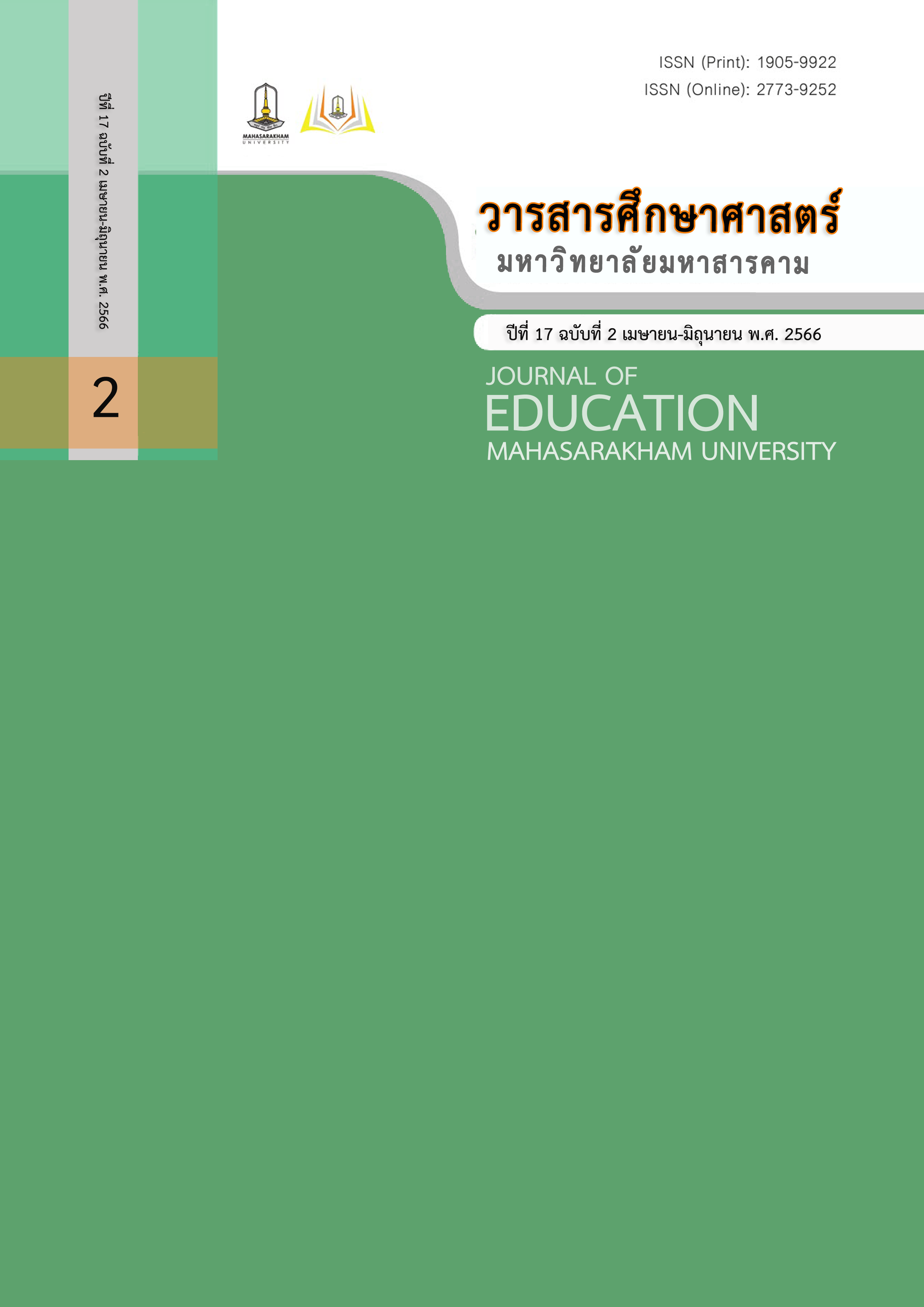The Development of Problem Solving Skill, Self-Regulation and Achievement in Mathematics on Sequences and Series for Grade 11th Students by using Learning Activity based on Metacognition Thinking Process
Main Article Content
Abstract
The purposes of this research were to 1) compare each student’s mathematical problem-solving skill with 70 percent criterion, 2) compare four times of self-regulation skill, 3) compare mathematics learning achievement before and after receiving learning activities based on metacognition thinking process. The samples of this study were 30 students in the 11th grade of Warin Chamrap School, Warin Charap District, Ubon Ratchathani Province, by cluster random sampling. The research instruments consisted of four teaching and learning plans – Sequences and Series, four items of mathematical problem-solving skill test, 20 items of self-regulation evaluation, and 30 items of mathematics achievement test (with the reliability of .85 and the IOC between 0.60-1.00). The data were analyzed by mean, standard deviation, t-test and ANOVA for one-way repeated measure.
The research findings were as follows: 1. The mathematical problem-solving skill of the sample group after the third time and the fourth time of learning mathematics by using metacognition thinking process were higher than 70 percent criterion at .05 level of statistical significance. 2. The self-regulated skill of the sample group after the second time and third time of of learning mathematics by using metacognition thinking process were different at .05 level of statistical significance. 3. The learning achievement of the samples after employing the activities based on metacognitive thinking was higher than before at .05 level of statistical significance.
Downloads
Article Details

This work is licensed under a Creative Commons Attribution-NonCommercial-NoDerivatives 4.0 International License.
References
กนกพร ริยาพันธ์. (2562). ผลของกิจกรรมการเรียนรู้ที่ใช้เมตาคอกนิชันในการแก้ปัญหาทาง คณิตศาสตร์ที่มีต่อผลสัมฤทธิ์ทางการเรียน เรื่อง การแก้สมการกําลังสองตัวแปรเดียวของนักเรียนชั้นมัธยมศึกษาปีที่ 4. วารสารบัณฑิตศึกษา, 16(72), 112-118.
กระทรวงศึกษาธิการ. (2560). ตัวชี้วัดและสาระการเรียนรู้แกนกลาง กลุ่มสาระการเรียนรู้ คณิตศาสตร์ (ฉบับปรับปรุง พ.ศ.2560) ตามหลักสูตรแกนกลางการศึกษาขั้นพื้นฐาน พุทธศักราช 2551. กรุงเทพฯ: ชุมนุมสหกรณ์การเกษตรแห่งประเทศไทย.
กิตติพันธ์ วิบุลศิลป์. (2560). ผลการจัดกิจกรรมการเรียนรู้คณิตศาสตร์ตามแนวคิดห้องเรียนกลับทางร่วมกับการเรียนรู้เชิงรุกที่มีต่อความสามารถในการแก้ปัญหาคณิตศาสตร์และความสามารถในการคิดอย่างมีวิจารณญาณของนักเรียนมัธยมศึกษาปีที่ 5. วิทยานิพนธ์ ครุศาสตรมหาบัณฑิต, จุฬาลงกรณ์มหาวิทยาลัย.
คณะกรรมาธิการนานาชาติว่าด้วยการศึกษาในศตวรรษที่ 21. (2551). การเรียนรู้: ขุมทรัพย์ในตน= learning: the treasure within. สำนักงานคณะกรรมการการศึกษาแห่งชาติ.
จินตวีร์ โยสีดา. (2560). การพัฒนารูปแบบการจัดการเรียนรู้วิทยาศาสตร์เพื่อส่งเสริมการกํากับ ตนเองในการเรียน สำหรับนักเรียนชั้นมัธยมศึกษาปีที่ 5. วิทยานิพนธ์ปรัชญาดุษฎีบัณฑิต มหาวิทยาลัยมหาสารคาม.
ชัยวัฒน์ สุทธิรัตน์. (2553). นวัตกรรมการจัดการเรียนรู้ที่เน้นผู้เรียนเป็นสำคัญ. พิมพ์ครั้งที่ 3. กรุงเทพฯ : แดเน็กซ์ อินเตอร์คอร์ปอเรชั่น.
ทิศนา แขมมณี และคณะ. (2544). วิทยาการด้านการคิด. กรุงเทพฯ : เดอะมาสเตอร์กรุ๊ป แมเนจเม้นท์.
ธูปทอง กว้างสวาสดิ์. (2554). การสอนการคิด. กรุงเทพฯ : สํานักพิมพ์ข้าวฟ่าง.
นิวัฒน์ สาระขันธ์. (2564). สอนอย่างไรให้นักเรียนเกิดทักษะและกระบวนการทางคณิตศาสตร์. Journal of Roi Kaensarn Academy, 6(4), 203-218.
ประพันธ์ ศิริสุเสารัจ. (2551). การพัฒนาการคิด. พิมพ์ครั้งที่ 2. กรุงเทพฯ : 9119 เทคนิคพรินติ้ง.
ปริญา ปริพุฒ. (2559). การพัฒนารูปการณ์เรียนรู้ตามแนวคิดการเรียนรู้ส่วนบุคคลเพื่อส่งเสริมความเป็นผู้เรียนรู้อย่างเชี่ยวชาญ. วิทยานิพนธ์ปรัชญาดุษฎีบัณฑิต มหาวิทยาลัยมหาสารคาม.
ปัญจวิชญ์ ทองสุข. (2564). ผลของการจัดกิจกรรมการเรียนรู้คณิตศาสตร์ โดยใช้เมตาคอกนิชันในการแก้ปัญหาร่วมกับคําถามระดับสูงที่มีต่อความสามารถในการแก้ปัญหาคณิตศาสตร์และการกำกับตนเองในการเรียนของนักเรียนชั้นมัธยมศึกษาปีที่ 3. วิทยานิพนธ์การศึกษามหาบัณฑิต มหาวิทยาลัยบูรพา.
โรงเรียนวารินชําราบ. (2562-2564). รายงานผลการทดสอบทางการศึกษาระดับชาติขั้นพื้นฐาน (O-NET).
โรงเรียนวารินชําราบ. (2564). รายงานการประเมินตนเอง ประจำปีการศึกษา 2563.
วัฒนา บุญเพ็ง. (2556). การพัฒนากิจกรรมการเรียนการสอนคณิตศาสตร์โดยใช้ยุทธวิธีเมตาคอกนิชัน เรื่อง สมบัติของจำนวนนับชั้นมัธยมศึกษาปีที่ 1. วิทยานิพนธ์ศึกษาศาสตรมหาบัณฑิตมหาวิทยาลัยราชภัฏสกลนคร.
วิจารณ์ พานิช. (2556). การสร้างการเรียนรู้สู่ศตวรรษที่ 21. กรุงเทพฯ : เจริญการพิมพ์.
สถาบันส่งเสริมการสอนวิทยาศาสตร์และเทคโนโลยี. (2560). สรุปข้อมูลเบื้องต้น PISA 2015. กรุงเทพฯ: สถาบันส่งเสริมการสอนวิทยาศาสตร์และเทคโนโลยี.
สำนักงานคณะกรรมการพัฒนาการเศรษฐกิจและสังคมแห่งชาติ. (2561). ยุทธศาสตร์ชาติ 20 ปี (พ.ศ. 2561-2580). กรุงเทพฯ: สำนักงานเลขานุการของคณะกรรมการ.
สำนักงานเลขาธิการสภาการศึกษา. (2562). เข้าใจสมรรถนะอย่างง่ายๆ ฉบับประชาชนและเข้าใจหลักสูตรฐานสมรรถนะอย่างง่ายๆ ฉบับครู ผู้บริหาร และบุคลากรทางการศึกษา. สำนักงานเลขาธิการสภาการศึกษา.
สลิลดา ลิ้มเจริญ. (2560). ผลของการจัดกิจกรรมการเรียนรู้คณิตศาสตร์ โดยใช้เมตาคอกนิชันในการแก้ปัญหาที่มีต่อความสามารถในการแก้ปัญหาและผลสัมฤทธิ์ทางการเรียนคณิตศาสตร์ของนักเรียนชั้นมัธยมศึกษาปีที่ 4. วิทยานิพนธ์การศึกษามหาบัณฑิต มหาวิทยาลัยบูรพา.
สำนักวิจัยและพัฒนาการศึกษาสำนักงานเลขาธิการสภาการศึกษา กระทรวงศึกษาธิการ. (2561). สภาวการณ์การศึกษาไทยในเวทีโลก พ.ศ.2559/2560. บริษัทหวานกราฟิก จํากัด.
Abu Bakar, M. A., & Ismail, N. (2020). Mathematical Instructional. A conceptual of redesign of active Learning with metacognitive regulation strategy. International Journal of Instruction, 13(3), 633-648.
Daniel, M. & Christian, B. (2020). Metacognition and self-regulation. evidence review. University of Southampton.
Ertmer, P.A. &T.J. Newby. (1996). The Expert Learner: Strategic, Self-regulated, and Reflective. Instructional Science, 24,1-24.
Laistner, N. (2016). Metacognition and student achievement in mathematics. State University of New York.
Winarti, Ambaryani, S. E., & Putranta, H. (2022). Improving learners’ metacognitive skills with self-regulated learning based problem-solving. International Journal of Instruction. 15(1), 139-154.


